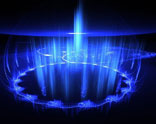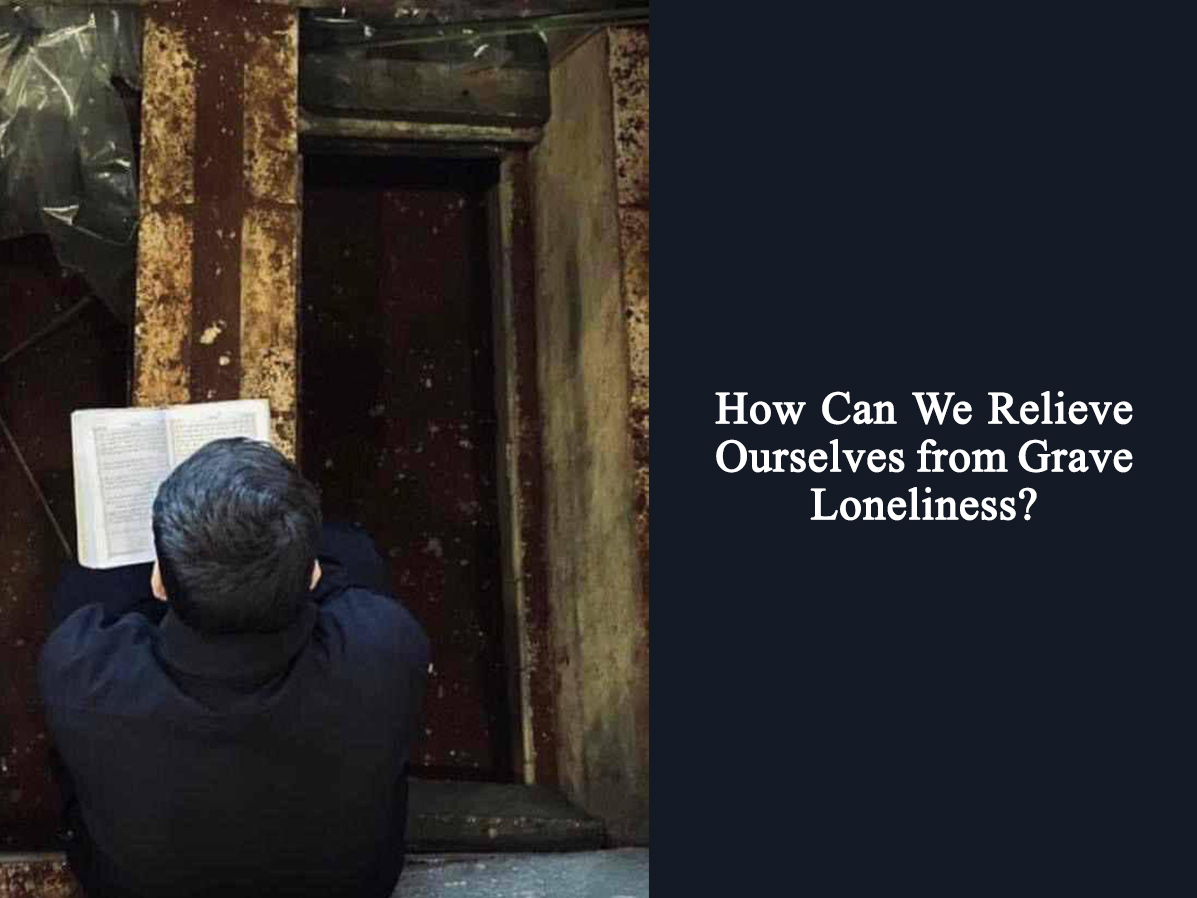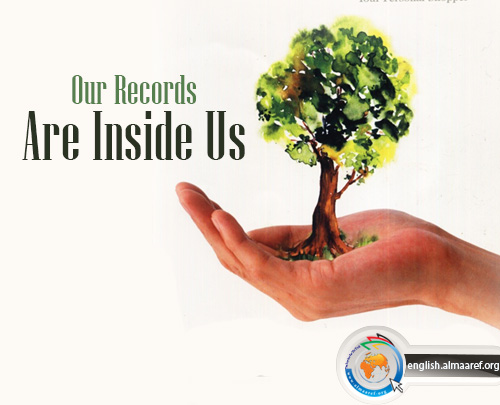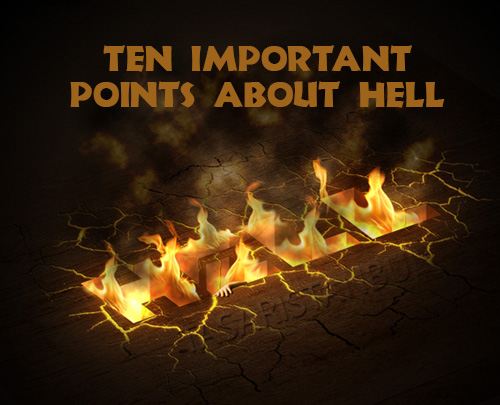The Two Aspects of Death
Death & Purgatory
Although the phenomenon of life counts as the most precious of gifts and its loss is extremely grievous and terrifying, none can doubt that just as surely as man embarks on his life involuntarily to spend some time in this guest house we call the world, he must ultimately confront the painful and frowning face of death when the scroll of his life is rolled up.
Our world is a world of turmoil and instability. The wheel of birth and death keeps constantly turning; do not believe that anything can come into being in the sphere of this cycle without being subject to change.
Whatever comes into existence must traverse a path leading to death; it makes, no difference whether it be man or one of the other countless forms of life. Every phenomenon the limits of whose motion are set by matter is ephemeral, for it is precisely its defining characteristic that draws it on toward non existence; the end of its affair is disappearance. The funeral dirge of finiteness resounds throughout the world of being.
We must first raise the complex question of the end of life, attempt to analyze it and to answer some of the questions that may be raised in this respect.
Is life restricted to this present terrestrial existence which stretches from the moment of birth to the moment of death? Is it confined to the brief interval during which those who have come to this world take, one after another, the place of those who have left it? Should it be imagined that there is no existence other than the three-dimensional existence of this world, and that our individual character characteristics and personalities bear the imprint of non-being? Or is it true that beyond this existence an eternal morrow awaits man, which will enable him to perceive himself and the world? Will the physical system of this world be transformed into another world and manifest a new and perfected form?
Finally, in all these arrivals and departures, in these assumptions of form and annihilations, is there some divine purpose at work? In other words, did God's will determine that man, the choice part of His creation, should live in this world as a traveler, a transient, and move ultimately to another world which will be his eternal abode?
If we conceive of death in the light of the first set of possibilities, then life - under whatever circumstances it is Character spent - will be full of misery and pain, for the anticipation of annihilation and non-being inevitably arouses dread in man and paralyzes him with the undeniable torment it induces.
The second vantage point is that of a person who finds refuge in the concept of a world beyond nature which enables him to place this world in perspective. He is convinced that man and the universe advance together in a pattern determined by God's unity and that their forward movement is unending. For such a person death is simply the breaking of the narrow and confining cage of the body and his being liberated from it, entering thereby an ideal and enrapturing -realm. For such a person death is merely the substitution of one form to another, a change of outer garb. When death arrives man abandons this garb and his form of clay and puts on the garment of the transitional realm. Then, ascending from that stage to the next and flying toward infinity, he casts off in turn the garb of the transitional realm and puts on the raiment of eternity.
For those who hold this exalted and precious belief, the end of life is a transformation overflowing with good, a transformation that enables all things to recover their identity and to be purified.
Dr. Carrel the well-known scholar says:
"The answer given by religion to the anxiety man feels when confronted with the mystery of death is infinitely more satisfactory than that given by science; religion gives man the answer his heart desires."1
The bitterness and unpleasantness of leaving this world are seen as natural and inevitable by those who imagine that their passage through the wall of death spells an end to all dimensions of their existence and that there is no life beyond that frontier. But for those who believe that this world is nothing more than an elaborate game, similar to that in which children or artists engage, and that quitting this world of matter is a form of progress and ascent in the direction of infinity, the matter takes on a quite different aspect. Not only does the countenance of death lose for them its horror and awe; they even long impatiently for release from their body of clay in order to be joined in union with Him.
Such an understanding of the nature of death impels man to pursue pure and exalted aims, to the point of heroically sacrificing his life for their sake. Then, like a moth freed from its prison, he circles over his former place of confinement; like a warrior on the field of battle he accepts a bloody death. He sacrifices his personal motives and desires in order to attain a morrow filled with pride, glory, and lofty and positive ideals.
In the view of such a person, man has a two- dimensional life as an attribute that is uniquely his. One of the two dimensions is his material life, in which he is subject to biological circumstances and social necessities, and the other is his inner and spiritual life, a life in which he engages in thought, inventiveness, creativity, and the cultivation of ideals, gives external existence to his inner ferment and enthusiasm, and molds to his will the society in which he lives and even history adequately the nature of death induce fear, dread and insecurity in man, for they make death appear to be a terrible nightmare.
Imam al-Hadi, upon whom be peace, once went to visit one of his companions who had fallen sick. The fear of death had robbed him of all tranquility and calm, so the Imam addressed him as follows: "O servant of God, you fear death because you do not understand it correctly. Tell me: if your body were soiled with dirt so that you were pained and discomforted and afflicted with running sores, and you knew that a washing in the bathhouse would rid you of all that filth and pain, would you not wish to avail yourself of the bathhouse to cleanse yourself of the dirt? Or would you be reluctant to do so and prefer to -remain in your polluted state?"
The sick man replied: "O descendant of the Messenger of God! I would definitely prefer to wash myself and become clean."
To this the Imam responded: "Know, then, that death is exactly like the bathhouse. It represents your last chance to rid yourself of your sins and to purify yourself of evil. If death embraces you now, there can be no doubt that you will be freed of all sorrow and pain and attain everlasting happiness and joy."
Hearing these words of the Imam, the sick man changed completely and a remarkable tranquility appeared on his face. Then in dignified fashion, he surrendered himself to death, in the shroud he had drawn around himself, full of hope in God's mercy. He closed his eyes which had now seen the truth and hastened to his eternal abode."2
The Master of the God fearing, upon whom be peace, was one of those rare human beings who had truly understood the meaning of life and had caused death itself to fear him. Few men have advanced the claim that 'Ali made: "I swear by God that the son of Abu Talib is more at ease with death than a suckling infant with the breast of its mother." The whole of his life turns out on examination to be a proof for this claim. Why should that extraordinarily pure man, who never exaggerated concerning his love for God, not long day and night for the meeting with God Almighty, for hastening to His supreme presence? With his pure nature and exalted mind he had understood that death means liberation from the dark fetters of matter and the opening of the gates of eternity; why then should he fear death?
History does not record a noble hero other than the son of Abu Talib whose hand wielded the sword for almost fifty years and who encountered without spilling a single drop of blood unjustly, countless incidents which normally arouse feelings of hate and vengeance in man and rob him of his humanity.
This was his concept of life:
"Even if I were to be given the whole world and all it contains, I would not unjustly remove the husk of a single -grain from the mouth of an ant."
For this pious and commander who throughout his life granted the weak and the powerful their rights in equal measure, who showed care for the feeding of his murderer while suffering the pain of his fatal wounds, warfare and struggle represented a means for reform of man, not his destruction.
The vile murderer calculated that he would be able to carry out the assassination of 'Ali upon whom be peace, only when he was standing in worship before his Lord, with the whole of his being effaced in the splendor of the Creator; it was this that enabled him to implement his plan.
When he was struck with the wound that severed the cord of his life, 'Ali bade death welcome like a dear one he had long been awaiting, and said:
"I am free, by the Lord of the Kaaba! I have no fear if death should carry me off or death should befall me."
The relatives and companions who gathered round the bed of 'Ali had never seen the same amazing tranquility that they now saw in that ocean of courage, generosity, justice and piety, as he endured the painful wound that had been inflicted on him.
It may furthermore be said that the one who denies life after death looks on man from only one vantage point: he imagines him to be a creature wandering in the realm of matter and supposes that all of his existence is exhausted by the few passing moments his earthly body spends in this world. Such a view of things implies that the entire destiny of man consists of helpless exposure to a whole range of factors, known and unknown: he enters this world with great pain, maintains himself in it for a few days by enduring all kinds of oppression and injustice, and then finally departs in the embrace of death and annihilation.
Such a life would indeed be miserable, and to remain in the world under such circumstances would be painful. Whoever reaches this distressing conclusion about the destiny of man must view the nature of existence itself in the same way. For in his opinion it is not only whose life is spent in the whirlpool of pointlessness and injustice; whatever comes into existence must also traverse the path of meaninglessness and oppression until the moment of its annihilation. All things are engaged in injustice: whether it be man in his struggle for survival, an insect that inflicts a sting, or the drops of a rainstorm that destructively beat down on a hut. To take matters even further, this would mean that this transitory world lacks all legitimacy, that it is simply an assemblage of absurdity and injustice.
This is the view of the person who has severed his link with the eternal and everlasting being that is the source of all existence, and who thereby commits an error for which he must pay the price.
With such a person, sickness, deprivation, the inability to fulfill wishes and attain goals (or the loss of them after attaining them), fear of a dark and unknown future - all these serve to break his spirit and torment him.
Victor Hugo says:
If man thinks that he is faced with annihilation, that absolute non-being awaits him after this life, life itself will have absolutely no meaning for him. That which makes the life of man pleasant and enjoyable, makes his labor joyful, gives warmth to his heart, and broadens the horizons of his vision, is none other than what revelation and religion give man - belief in an eternal world, faith in the immortality of man, the conviction that 'You, O man, are not destined to non-being you are greater than this world, which is nothing more than a small and impermanent nesting-place for you, a cradle for your infancy - the era of your splendor and greatness still lies ahead."
The feeling of pointlessness, the lack of belief in the occurrence of resurrection and reckoning after this earthly existence, has become a source of crushing fear for man in this age of the progress of science and technology. With the inclination to material life that results from the one-sided development of man's capacities, he has now come to regard it as his ultimate goal.
All the innovations that are meant to protect man from so many dangers and errors, to liberate him from fetters and restrictions, have in fact robbed him of peace and tranquility and cast him into the whirlpool of anxiety. Our world has become a stage on which men rush madly forward in a single direction, for the sake of prosperity and power which they have made the source of their happiness and the aim of their strivings.
The result of this constricted view of things, the belief that the world has no owner, that man wanders through these ruins accountable to no one, is that the world is filled with fear and rapine. The smell of blood rises up from every corner of this abode of terror. This is the state of affairs that man has now reached; he is no longer himself, but a being filled with greed, cupidity, hatred and envy. It is unclear how matters will proceed. The emergence of new schools of philosophy is in itself a sign of the painful predicament in which man finds himself and of the intellectual and spiritual vacuum.
A psychiatrist writes:
"Two thirds of the patients that have come to me from all over the world are educated and successful people who are tormented by a great pain - the feeling that life is pointless, meaningless, and incomprehensible. The reason is that as a result of technology, the stagnation of beliefs, shortsightedness and prejudice, twentieth century man has become irreligious. In bewilderment he searches for his soul, but he will have no peace until he rediscovers religion. Lack of religion is the cause -for the emptiness and meaninglessness of life."3
Evil deeds form another reason for fearing death; it is obvious that they make death appear extremely fearsome and terrifying to the wrong doer.
As Mawlana Jalal ad-Din Rami says:
O you who attempt to flee death in your fear. It is yourself that you fear - use your intelligence!
It is your countenance that is ugly, not the visage of death; -Your -soul is a tree on which death is the leaf.
Yes, it is the fear of one's deeds that causes men to stand in terror of death. In this connection, the Qur'an remarks concerning the Jews:
﴾Say: 'O Jews, if you imagine that you alone are the friends of God, to the exclusion of all others, then desire death for yourselves, if you speak truly.' But they will never desire death, on account of the deeds they have freely performed. God is well aware of the deeds of the wrongdoers﴿ (62:6-8).
The Noble Qur'an depicts for us the fruitlessness of the lives of those who turn their back on the truth and struggle helplessly in the whirlpool of meaninglessness: ﴾Those whom they invoke other than the Creator can create nothing; rather they are themselves created. They are dead and lifeless, lacking all feeling and awareness, and they do not know when they will be resurrected﴿ (16:20-21).
﴾O Messenger, you cannot make these people whose hearts are dead hear through the word of truth, nor can you convey your -summons to these deniers who avert their faces﴿ (30:52).
By contrast, the Qur'an calls living and immortal those who are killed while seeking to elevate God's word: ﴾Do not call dead those who are killed in God's path; they are living in the presence of their God receiving sustenance from Him, although you do not perceive it﴿ (2:154).
* Resurrection Judgment and the Hereafter. Lessons on Islamic Doctrine (Lesson one). By Sayyid Mujtaba Musavi Lari. Translated by: Hamid Algar.
1- Rah-u-Rasm-i Zindagi, p.142.
2- Ma'ani- al-Akhbar, p.290.
3- Quoted in Kayhan, no.8196.




















